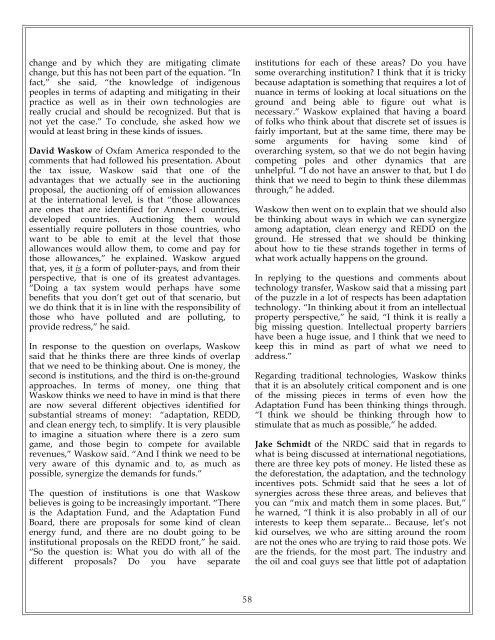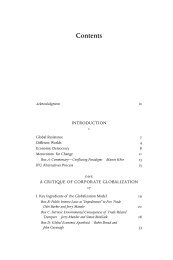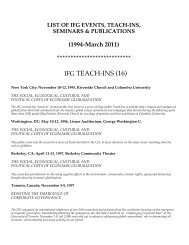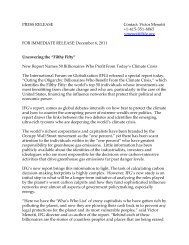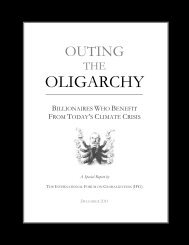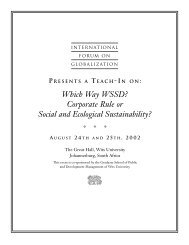UNDRIP Report - English FINAL - International Forum on Globalization
UNDRIP Report - English FINAL - International Forum on Globalization
UNDRIP Report - English FINAL - International Forum on Globalization
Create successful ePaper yourself
Turn your PDF publications into a flip-book with our unique Google optimized e-Paper software.
change and by which they are mitigating climate<br />
change, but this has not been part of the equati<strong>on</strong>. “In<br />
fact,” she said, “the knowledge of indigenous<br />
peoples in terms of adapting and mitigating in their<br />
practice as well as in their own technologies are<br />
really crucial and should be recognized. But that is<br />
not yet the case.” To c<strong>on</strong>clude, she asked how we<br />
would at least bring in these kinds of issues.<br />
David Waskow of Oxfam America resp<strong>on</strong>ded to the<br />
comments that had followed his presentati<strong>on</strong>. About<br />
the tax issue, Waskow said that <strong>on</strong>e of the<br />
advantages that we actually see in the aucti<strong>on</strong>ing<br />
proposal, the aucti<strong>on</strong>ing off of emissi<strong>on</strong> allowances<br />
at the internati<strong>on</strong>al level, is that “those allowances<br />
are <strong>on</strong>es that are identified for Annex-1 countries,<br />
developed countries. Aucti<strong>on</strong>ing them would<br />
essentially require polluters in those countries, who<br />
want to be able to emit at the level that those<br />
allowances would allow them, to come and pay for<br />
those allowances,” he explained. Waskow argued<br />
that, yes, it is a form of polluter-pays, and from their<br />
perspective, that is <strong>on</strong>e of its greatest advantages.<br />
“Doing a tax system would perhaps have some<br />
benefits that you d<strong>on</strong>’t get out of that scenario, but<br />
we do think that it is in line with the resp<strong>on</strong>sibility of<br />
those who have polluted and are polluting, to<br />
provide redress,” he said.<br />
In resp<strong>on</strong>se to the questi<strong>on</strong> <strong>on</strong> overlaps, Waskow<br />
said that he thinks there are three kinds of overlap<br />
that we need to be thinking about. One is m<strong>on</strong>ey, the<br />
sec<strong>on</strong>d is instituti<strong>on</strong>s, and the third is <strong>on</strong>-the-ground<br />
approaches. In terms of m<strong>on</strong>ey, <strong>on</strong>e thing that<br />
Waskow thinks we need to have in mind is that there<br />
are now several different objectives identified for<br />
substantial streams of m<strong>on</strong>ey: “adaptati<strong>on</strong>, REDD,<br />
and clean energy tech, to simplify. It is very plausible<br />
to imagine a situati<strong>on</strong> where there is a zero sum<br />
game, and those begin to compete for available<br />
revenues,” Waskow said. “And I think we need to be<br />
very aware of this dynamic and to, as much as<br />
possible, synergize the demands for funds.”<br />
The questi<strong>on</strong> of instituti<strong>on</strong>s is <strong>on</strong>e that Waskow<br />
believes is going to be increasingly important. “There<br />
is the Adaptati<strong>on</strong> Fund, and the Adaptati<strong>on</strong> Fund<br />
Board, there are proposals for some kind of clean<br />
energy fund, and there are no doubt going to be<br />
instituti<strong>on</strong>al proposals <strong>on</strong> the REDD fr<strong>on</strong>t,” he said.<br />
“So the questi<strong>on</strong> is: What you do with all of the<br />
different proposals? Do you have separate<br />
instituti<strong>on</strong>s for each of these areas? Do you have<br />
some overarching instituti<strong>on</strong>? I think that it is tricky<br />
because adaptati<strong>on</strong> is something that requires a lot of<br />
nuance in terms of looking at local situati<strong>on</strong>s <strong>on</strong> the<br />
ground and being able to figure out what is<br />
necessary.” Waskow explained that having a board<br />
of folks who think about that discrete set of issues is<br />
fairly important, but at the same time, there may be<br />
some arguments for having some kind of<br />
overarching system, so that we do not begin having<br />
competing poles and other dynamics that are<br />
unhelpful. “I do not have an answer to that, but I do<br />
think that we need to begin to think these dilemmas<br />
through,” he added.<br />
Waskow then went <strong>on</strong> to explain that we should also<br />
be thinking about ways in which we can synergize<br />
am<strong>on</strong>g adaptati<strong>on</strong>, clean energy and REDD <strong>on</strong> the<br />
ground. He stressed that we should be thinking<br />
about how to tie these strands together in terms of<br />
what work actually happens <strong>on</strong> the ground.<br />
In replying to the questi<strong>on</strong>s and comments about<br />
technology transfer, Waskow said that a missing part<br />
of the puzzle in a lot of respects has been adaptati<strong>on</strong><br />
technology. “In thinking about it from an intellectual<br />
property perspective,” he said, “I think it is really a<br />
big missing questi<strong>on</strong>. Intellectual property barriers<br />
have been a huge issue, and I think that we need to<br />
keep this in mind as part of what we need to<br />
address.”<br />
Regarding traditi<strong>on</strong>al technologies, Waskow thinks<br />
that it is an absolutely critical comp<strong>on</strong>ent and is <strong>on</strong>e<br />
of the missing pieces in terms of even how the<br />
Adaptati<strong>on</strong> Fund has been thinking things through.<br />
“I think we should be thinking through how to<br />
stimulate that as much as possible,” he added.<br />
Jake Schmidt of the NRDC said that in regards to<br />
what is being discussed at internati<strong>on</strong>al negotiati<strong>on</strong>s,<br />
there are three key pots of m<strong>on</strong>ey. He listed these as<br />
the deforestati<strong>on</strong>, the adaptati<strong>on</strong>, and the technology<br />
incentives pots. Schmidt said that he sees a lot of<br />
synergies across these three areas, and believes that<br />
you can “mix and match them in some places. But,”<br />
he warned, “I think it is also probably in all of our<br />
interests to keep them separate... Because, let’s not<br />
kid ourselves, we who are sitting around the room<br />
are not the <strong>on</strong>es who are trying to raid those pots. We<br />
are the friends, for the most part. The industry and<br />
the oil and coal guys see that little pot of adaptati<strong>on</strong><br />
58


